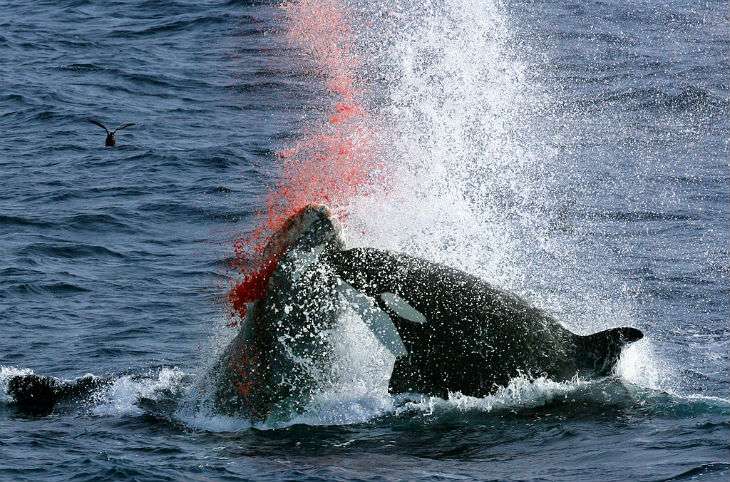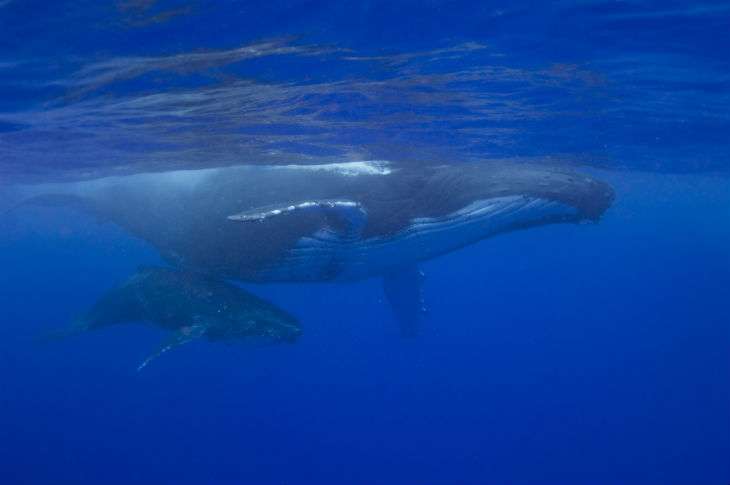Humpback whales are oceanic superheroes who save other species from orcas

Occasionally, we hear tales of animals defying what we consider the laws of nature to help or nurture a different species. We consider these freak occurrences. Anomalies. Interspecies altruism, we believe, is almost solely the bastion of humankind. And even then, not universally.
Now, a scientific survey published late last month is set to turn that thinking on its head. The survey, one of humpback whale and killer whale interactions, seems to confirm a trend that was previously only anecdotal - humpback whales go out of their way to protect other species from predatory killer whales.
Also read - International Tiger Day: Ranthambore and its majestic cats
Humpback heroes
The survey, a compilation of over a hundred accounts of killer whale and humpback interactions between 1951 and 2012, paints a picture of humpbacks as being, all at once, both altruistic and heroic.
The lead author of the paper, marine ecologist Robert Pitman, embarked on this survey after multiple instances of seemingly-heroic whale behaviour he encountered while studying killer whales.
Searching for orcas near the Antarctic peninsula, Pitman encountered a pod of 10 of them who the team had previously tagged for satellite tracking. In the midst of this pod however, were two adult humpback whales bellowing and thrashing at the water with their tails and flippers. The whales' aggression drove the orcas away.
The researchers thought the orcas might have been harassing the whales, something that's commonly observed. When they examined the footage though, they saw something amazing. Shielded by the two humpbacks, was a Weddell seal, a prey that the orcas may have been after. Still, they couldn't be sure whether the seal was using the whales for cover or whether the whales were actually protecting the seal.
Minutes later, the orcas were at it again. This time, their target was a crabeater seal on a small piece of ice. Even as the orcas made for the seal, the same pair of humpbacks intervened, circling the ice and driving the orcas away. Even this though, was explained away as just a confrontation between humpbacks and orcas.
A week later though, Pitman and his team had their minds blown when they witnessed yet another instance of humpback heroism. A Weddell seal that had been knocked into the water by orcas was about to become orca food when a different pair of humpbacks intervened. One even rolled over onto its back to allow the sea to clamber on to its belly. It even used its gigantic flippers to gently keep the seal on its belly and out of danger.
After the orcas were driven away, the seal was able to swim to safety. The incident caused Pitman to wonder if the humpbacks' actions were driven by compassion.
The multiple instances he has collated since seem to indicate that whether or not the whales are acting out of compassion, this behaviour is a trend rather than an anomaly.
Also read -Tigers, rhinos may not live till the 22nd century if we don't act now: wildlife scientists
A global phenomenon
The instances of humpback-orca interactions compiled by Pitman, 115 in all, make it clear that what Pitman saw was not a one-off. These instances, the accounts of 54 independent sources ranging from laypeople to marine experts, are scattered across the globe. This shows that this phenomenon is not particular to a few vigilante humpbacks and is, in fact, normal humpback behaviour.
What's more, a lot of the cases reported weren't just opportunistic interactions. In a lot of cases, possibly alerted by orca hunting calls, humpbacks travelled considerable distances to engage them, attempting to prevent their attacks. In one instance, three humpbacks, all of whom were spotted separately hours earlier, travelled distances ranging between 6.5 kilometres to 7.6 kilometres away to face the orcas.

All of this for energy-intensive battles they had no reason to fight. What's as impressive is the time spent on these encounters. The longest recorded face-off was during an instance where a pod of orcas had killed a grey whale calf. At least 16 humpbacks converged on the scene, trying to interrupt the orcas from devouring their kill. Observers reached after the confrontation began. Over six hours later, they left even as the whales continued their intervention.
Amazingly, there's even footage of the event thanks to killer whale expert Alisa Schulman-Janiger , and it's absolutely phenomenal to watch:
According to Pitman's paper, humpbacks were "reportedly responsible for the escape of at least two humpbacks, two gray whales, probably a Weddell seal, and an unrecorded number of sea lions."
Altruism or instinct?
So what then explains the humpbacks heroic behaviour? Some experts believe this is an evolutionary response brought on by millennia of killer whales preying on humpbacks.
In all the recorded interactions between killer whales and adult humpbacks, there were no humpback casualties. Adult humpbacks were simply too large to be preyed on by the smaller orcas, despite the latter's efforts.
However, calves and juvenile humpbacks were still at risk. There has been more than one instance of them being killed by orcas. This has evidently happened enough for adult humpbacks to instinctively perceive orcas as threats and therefore engage them. Even when humpbacks and other cetaceans have been exposed to orca vocalisations, they often display defensive behaviours.

It could be that the defence of other species by humpback whales may just be a spillover of this relationship between humpbacks and orcas.
But maybe, just maybe, this is something greater than simple evolutionary instinct. Maybe these gargantuan creatures are more intelligent and empathetic than we could possibly imagine. In fact, Pitman's writing says it best: "When a human protects an imperiled individual of another species, we call it compassion. If a humpback whale does so, we call it instinct. But sometimes the distinction isn't all that clear."
More from Catch -International Tiger Day: 97% of wild tigers lost in the last century
First published: 9 August 2016, 23:59 IST






![BJP's Kapil Mishra recreates Shankar Mahadevan’s ‘Breathless’ song to highlight Delhi pollution [WATCH] BJP's Kapil Mishra recreates Shankar Mahadevan’s ‘Breathless’ song to highlight Delhi pollution [WATCH]](https://images.catchnews.com/upload/2022/11/03/kapil-mishra_240884_300x172.png)

![Anupam Kher shares pictures of his toned body on 67th birthday [MUST SEE] Anupam Kher shares pictures of his toned body on 67th birthday [MUST SEE]](https://images.catchnews.com/upload/2022/03/07/Anupam_kher_231145_300x172.jpg)






